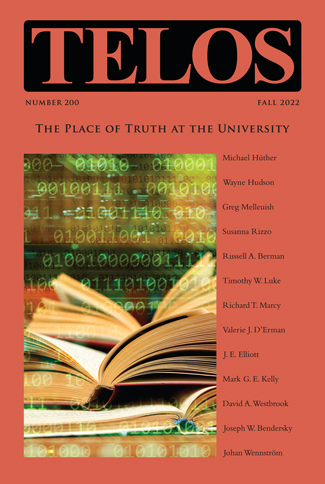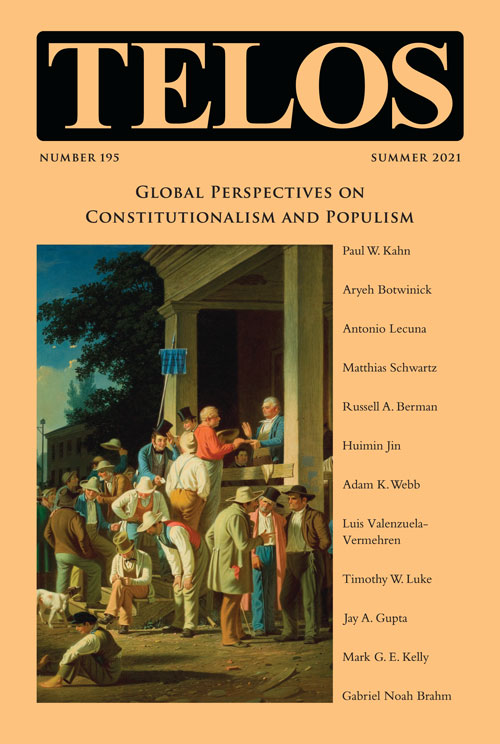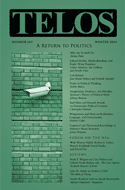In today’s episode of the Telos Press Podcast, David Pan talks with Michael Hüther about his article “Tired of Science?! Notes on the Relationship between University and Society,” from Telos 200 (Fall 2022). An excerpt of the article appears here. In their conversation they discuss what has become problematic in the relationship between science and truth and the relationship between science and values; how we should understand the role of myth in human society and why it continues to be important; how moralization responds to the dissatisfaction with science and the continuing relevance of myth; the dangers of moralization for the university; the driving forces behind the economization of the university as well as the consequences of this economization; how the German constitution establishes the social and political roles of the university; and how the university fulfills these roles today. If your university has an online subscription to Telos, you can read the full article at the Telos Online website. For non-subscribers, learn how your university can begin a subscription to Telos at our library recommendation page. Print copies of Telos 200 are available for purchase in our online store.
|
Telos 200 (Fall 2022): The Place of Truth at the University is now available for purchase in our store. Individual subscriptions to Telos are also available in both print and online formats.
Telos 195 (Summer 2021): Global Perspectives on Constitutionalism and Populism is now available for purchase in our store. Individual subscriptions to Telos are also available in both print and online formats.
Isaac Lopez has argued in a commentary published recently on this site that Trump has a good chance of winning this November because the liberals have replaced “American values” with laws and norms that are foreign and enraging. In response, the “silent majority” (in fact, a minority) of Americans elected “a very stable genius.” This essay is about the nature of an aspect of Donald J. Trump’s governance that has been overlooked: his cult. None of the usual political arguments can explain the desperate stances taken by his followers. The explanation offered here is twofold: One is the need for reversing a feared path to secular “socialism.” The second is that Trump has asserted that reality is subject to his will and personality. Ancillary to this is the idea that Trump’s persona can unify America by subordinating “difference” to a mythic national identity. Donald Trump has, for a large minority (possibly 40 percent of the electorate), the persona of a mythic Hero. A Hero who can overcome all obstacles by sheer will. Through a close reading of Trump’s angry language, one realizes that Trump has woven a recognizable myth for citizens bereft of purpose and power. This is Trump’s will-to-power. Trump has given meaning and purpose to people losing out to technology, urban wealth, science’s truth, and social helplessness exacerbated by the pandemic. He is a hero of revenge against regulators, the media, and modernity itself. Even the pandemic cannot overcome him; he overcomes the pandemic, until recently. As an occasional feature on TELOSscope, we highlight a past Telos article whose critical insights continue to illuminate our thinking and challenge our assumptions. Today, Erik Pomrenke looks at Adam Kotsko’s “On Agamben’s Use of Benjamin’s ‘Critique of Violence'” from Telos 145 (Winter 2008). “On Agamben’s Use of Benjamin’s ‘Critique of Violence'” represents an illuminating attempt by Adam Kotsko to reassert the primacy of Walter Benjamin over Carl Schmitt in Giorgio Agamben’s work. These two thinkers serve alongside Heidegger, Aristotle, Foucault, and Arendt as the center of Agamben’s genealogy of bare life; as such, configuring this constellation correctly is of signal importance to the reception of Agamben’s Homo Sacer project. Kotsko contends that Benjamin’s primacy is both a theoretical and chronological matter. Johnny Brennan’s “Imagination, Prophecy, and Morality: The Relevance and Limits of Spinoza’s Theory of Political Myth” appears in Telos 169 (Winter 2014). Read the full version online at the Telos Online website, or purchase a print copy of the issue in our store. |
||||
|
Telos Press Publishing · PO Box 811 · Candor, NY 13743 · Phone: 212-228-6479 Privacy Policy · Data Protection Copyright © 2024 Telos Press Publishing · All Rights Reserved |
||||


 How should we understand myth in the political realm? Some see myth as a dangerous form of regression that allows its utilizers to reorient the consciousness of a population toward dangerous ends. Others see myth as a necessary spark to incite revolutionary progress; myth brings with it the emotional charge needed to unite a population into action. Yet others see myth as a set of training wheels helpful for grasping more difficult and abstract concepts—training wheels which some are never meant to take off. Spinoza stands unique in that he is able to incorporate all of these dimensions of political myth. His motivating question is not what myth is, but rather what are its legitimate uses. Myth can be progress, but used improperly can also lead to regression. Myth relies on the basest form of knowledge in order to be able to communicate to all people, but cannot last if it is blindly accepted. Myth, for Spinoza, is inseparable from our lives and from society; it is a part of our mental construction and in that manner can be used for progress. But myth also has its limits, and should it surpass those limits it can lead to a culture of superstition that will regress to more primitive forms. Spinoza’s is a more successful theory of political myth because it is more accepting of, and true to, the way myth acts in our individual and social lives.
How should we understand myth in the political realm? Some see myth as a dangerous form of regression that allows its utilizers to reorient the consciousness of a population toward dangerous ends. Others see myth as a necessary spark to incite revolutionary progress; myth brings with it the emotional charge needed to unite a population into action. Yet others see myth as a set of training wheels helpful for grasping more difficult and abstract concepts—training wheels which some are never meant to take off. Spinoza stands unique in that he is able to incorporate all of these dimensions of political myth. His motivating question is not what myth is, but rather what are its legitimate uses. Myth can be progress, but used improperly can also lead to regression. Myth relies on the basest form of knowledge in order to be able to communicate to all people, but cannot last if it is blindly accepted. Myth, for Spinoza, is inseparable from our lives and from society; it is a part of our mental construction and in that manner can be used for progress. But myth also has its limits, and should it surpass those limits it can lead to a culture of superstition that will regress to more primitive forms. Spinoza’s is a more successful theory of political myth because it is more accepting of, and true to, the way myth acts in our individual and social lives. 






